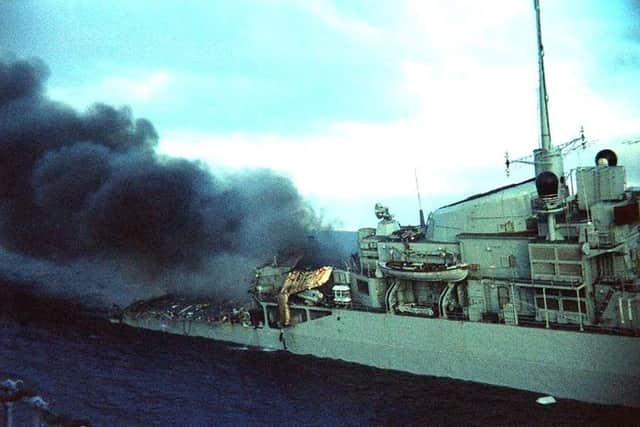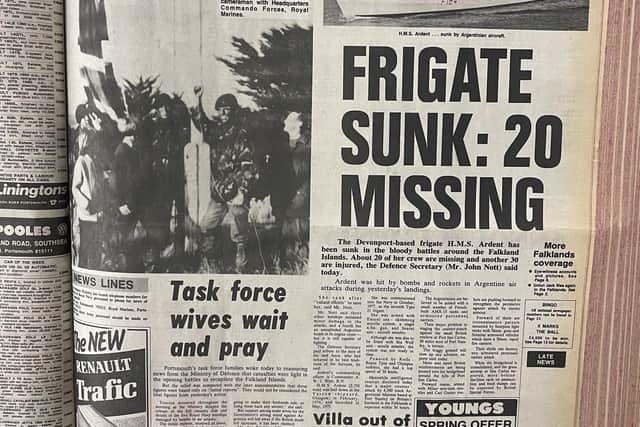Falklands 40: Headlines from The News on May 22, 1982
and live on Freeview channel 276
Frigate sunk: 20 missing
The Devonport-based frigate HMS Ardent has been sunk in the bloody battles around the Falkland Islands. About 20 of her crew are missing and another 30 are injured, the Defence Secretary (Mr. John Nott) said today.
Ardent was hit by bombs and rockets in Argentine air attacks during yesterday’s landings.


She sank after ‘valiant efforts’ to save her, said Mr Nott.
Advertisement
Hide AdAdvertisement
Hide AdMr Nott said three other warships sustained minor damage in the attacks, and a fourth has an unexploded Argentine bomb in its engine room - but it is still capable of fighting.
The Defence Secretary paid tribute to the men of the task force, who had behaved in the best traditions of the Services, he said.
Ardent’s commanding officer is Commander Alan West, RN.


HMS Ardent (2,750 tons) was laid down at the Yarrow shipyard, Glasgow, in February, 1974, and launched in May, 1975.
Meanwhile intelligence sources disclosed today that a major counter-attack by 4,500 crack Argentinian Marines based at Port Stanley on Britain’s foothold in the Falklands is expected within 30 hours.
Advertisement
Hide AdAdvertisement
Hide AdThe Argentinians are believed to be armed with a small number of French-built AMX-13 tanks and armoured personnel carriers.
Their major problem in staging the counter-punch against the small British enclave at Port San Carlos, 50 miles west of Port Stanley, is terrain.
The boggy ground will slow up any advance, experts said today.
Ceasefire ‘but with defence’
Britain has told the UN Security Council she strongly opposes any Falklands ceasefire which might limit her right of self-defence.
Advertisement
Hide AdAdvertisement
Hide AdA council debate called after the failure of peace efforts by Secretary-General Javier Perez de Cuellar and yesterday’s escalation of the fighting entered its second day today.
No resolution has yet been submitted to the council pending the expected arrival of several Latin American foreign ministers, including Nicanor Costa Mendez of Argentina.
British UN representative Sir Anthony Parsons told the council his government was ready to consider any course which promised a peaceful solution.
Storming ashore
The Union Jack was raised - seven weeks to the day after the Argentinian invasion - by three Royal Marines Commandos.
Advertisement
Hide AdAdvertisement
Hide AdBBC reporter Robert Fox, who went ashore with the parachute troops, said in a dispatch: “During the landing there was a persistent initial bombardment.
“Only one of the units, another parachute battalion, encountered resistance and there was a brisk fight. There were Argentinian casualties and prisoners.”
The assault troops were then subjected to continuous attacks by Argentinian aircraft, particularly the ‘vicious’ ground-attack Pucara.
Water bus idea
Portsmouth needs a public water bus to visit places of historical interest, according to Paulsgrove county councillor Dr John Attrill.
Advertisement
Hide AdAdvertisement
Hide AdHe has written to the city and county councils asking that the idea be ‘properly investigated’.
Mr Attrill wants to see a public transport link by water to let tourists visit the various heritage sites in the Portsmouth and Gosport area.
‘There is one provided to the sites on the River Rhine in West Germany, and to the River Seine in Paris,’ he said.
Mr Attrill has urged the city council to seek financial help from the county council to get the scheme off the ground.